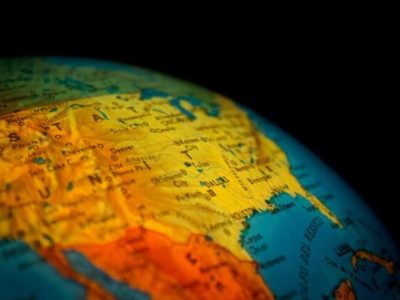When I turned five years-old, I literally held the world in my hands. My parents gave it to me for my birthday, wrapped in a red ribbon. As I held it with my short fingers, the first thing I did was look for Ecuador. My eyes sailed the oceans, traced a path through each continent, but couldn’t spot the country where the Pacific Ocean meets the Andes. Bewildered, I looked up to my mom and asked where we were. She bent over and pointed at one of the smallest countries in South America, which her fingertip mostly covered. I couldn’t believe that in such a big world, my origin could go unnoticed. Even I had overlooked my own country.
My freshman year in college reminded me of that moment. Before leaving Quito, I was hyperaware of the challenge that comes with traveling 3,000 miles from home. I would be leaving the music in people’s voices, the colorful plates of food and the sunny weather. But I never expected to deliver a speech and defend my origins in front of a crowd of upperclassmen.
To put it delicately, speech has never been my greatest skill. However, all communication majors at Boston College need to take a public speaking course. A few weeks in, I’d already attempted to deliver speeches; I wrote down my notes on color-coded flashcards and even forced my roommate to pretend to listen as I practiced. Despite these efforts, I always found myself standing behind the podium with my hands shaking and my voice trembling. So I never would’ve expected my greatest speech to happen without any preparation whatsoever.
One day, as I walked into the class, I couldn’t help but notice the intimidating white letters written on the blackboard: impromptu speeches. My professor walked around with a basket full of random topics. Each of us would have three minutes to plan a short speech to deliver in front of the class. In the suspense-ridden half hour that followed, I heard the widest variety of topics. They were as controversial as child labor and as trivial as pineapple on pizza. Every surprising topic made me more anxious.
Finally, it was my turn to draw a paper. I felt a million eyes piercing through me as I opened it and read aloud: What it means to be an American. My mind went completely blank. How did I, the only international student in the room, get that topic? As I made my way to the front of the class, I heard someone say, “Well, that’s ironic,” followed by giggles from all around the room. And suddenly, it hit me: Why would that ever be ironic? I am an American.
America is not a country; it is a continent. Within North and South America you’ll find multiple nations, which we recognize by their own names. As an Ecuadorian, being American involves an acknowledgment of different cultures within your own and a certain way of experiencing the world that cannot be narrowed down to a single nation. Both North and South America are composed of different textures and colors, where everyone dances to the rhythm of their own footsteps. In Latin America we celebrate these differences, while still embracing the broadness of the term. Still, many people use the term America to refer to a single country: The United States. Although in Latin America we don’t commonly refer to ourselves as American, we know that we’re entitled to the claim despite not being from the United States.
I finished my speech before actually realizing it was over. My classmates applauded and my teacher smiled. I never actually thought that something so hard for me to do could ever give me so much confidence and pride. I realized that through my interest in communication, I can do much more than just give a voice to the issues I feel the most passionate about. In fact, I can go so far as to earn my own voice among the screams of the majority and have the world in my hands once again.



















